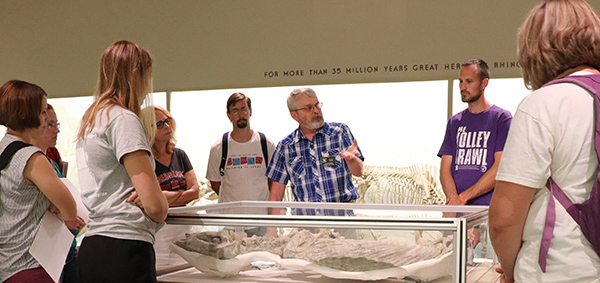
Earn 3 graduate credits conveniently this summer
Earn 3 graduate credits conveniently this summer through the Nebraska Math and Science Summer Institutes (NMSSI). Apply to the University of Nebraska-Lincoln as a Post-Baccalaureate (Non-Degree) program for Summer 2023 via https://go.unl.edu/gradapp. You can take up to six courses as a post-bac student!
Science courses near you this summer are:
GEOS 898: Nebraska Geology Through Time
June 26-30, 8 a.m. – 5 p.m., UNL City Campus
This course is a one-week tour through key events in the geologic history of Nebraska. We will begin 1.8 billion years ago, with the mountain-building events that created the oldest rocks in Nebraska. Subsequently, we will step through time in chronological order, taking a couple of virtual field trips. The course may include a tour of the paleontology displays in the State Museum, learning in detail about the Highway Paleontology program and Nebraska’s Cenozoic Megafauna. We will finish with an overview of relatively recent (~5 million year) geomorphologic and geologic processes in Nebraska, so that students are equipped to incorporate a Nebraska-based examples into a variety of learning modules.
PHYS 892: Vectors in Introductory Physics
July 17-28, M-F, 9 a.m.-noon, Jorgensen Hall, UNL City Campus
Vectors are reviewed by exploring problem-solving strategies for the (typically "harder") starred end-of-chapter problems in high school textbooks and extended into 3-dimensions with the introduction vector algebra that defines "cross" and "dot" products. All material will be presented at a level understandable to those with only a background in algebra. Building upon the interpretation of simple straight line to curved graphs of time-varying motion, force, and energy, the basic algebraic definitions of physical quantities are used to gently introduce the calculus concepts of differentiation and integration.
If you can’t travel to Lincoln those weeks, other options online are:
ASTR 892: Life in the Universe for STEM Teachers
May 30-June 30, online (asynchronous)
This course on astrobiology focuses on the question “Are we alone in the Universe?” and applies scientific reasoning to the possibility of life somewhere other than Earth. It will study how life arose, how it has evolved over time and the conditions necessary for life to exist. It includes topics and pedagogical strategies in astronomy, biology, geology, paleontology and chemistry, and utilizes an integrative interdisciplinary approach needed to study today’s complex problems. This course may also be appropriate for seventh- and eighth-grade teachers. This course is appropriate for mathematics teachers with secondary certification.
BIOS 891: Physiology in Extreme Environments
July 10-21, 2 p.m. – 4 p.m., web conferencing
This two-week course will explore organismal physiology in extreme environments. Students will engage with real-world examples of extreme physiology and adaptations in harsh environments such as how giant mammals can survive in deserts, how mosses and ferns can thrive in the tundra, and how some fish endure sulfidic water! Additionally, overarching themes across multiple physiological systems will be integrated cross-cutting concepts in physics and chemistry.
Visit the course catalog to see more details: https://go.unl.edu/nmssi-course-catalog-2023.
NMSSI courses that are not online asynchronous qualify for a 20% tuition discount on resident tuition for Nebraska teachers. You can apply now for additional NMSSI Fellowships, and read more about the costs at https://scimath.unl.edu/nmssi-costs-2023.
The Benefits of the NMSSI:
• Each course is worth 3 graduate credit hours
• Courses are offered utilizing several instructional models to allow for flexibility in scheduling
• Don’t want to declare a master’s degree yet? Enroll in one simple application as a post-bac student at https://go.unl.edu/gradapp
• Teachers can apply for additional tuition fellowships from the NMSSI: https://forms.gle/ZiBsQbnbcRJWtXmu5
Contact us at nebraskamath@unl.edu with questions.